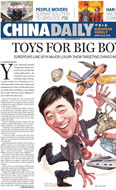Story that never ends
Updated: 2011-04-08 12:40
By Andrew Moody (China Daily European Weekly)
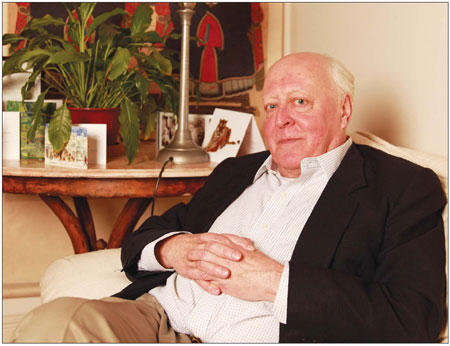 |
|
Jonathan Fenby is writing a new book about contemporary China. |
A veteran journalist and writer devotes his time to chasing the pulse of a fast-changing country
When China is in the news, Jonathan Fenby is never far from some broadcast studio or other.
Before our interview in his mansion flat, appropriately near London's School of Oriental and African Studies, I had heard him twice in a matter of days on the BBC's flagship early morning Today radio program, talking on subjects as diverse as the price of vegetables in China and the country's future general direction.
At 68, he has become the "Old China Hand" incarnate, even though he had never set foot in the country until he had notched up his own personal half century.
"I am getting up at 7 am to do CNBC. Yes, there are a lot of early mornings," he says.
Fenby, who exudes a hail-fellow-well-met bonhomie, is nothing if not prolific. He has written 11 books in the space of 12 years. When we last met in Beijing, it was to discuss the paperback edition of The Penguin History of Modern China.
Despite the intervening period being less than two years, he has since written a full-scale biography of Charles de Gaulle, called The General: Charles de Gaulle and the France He Saved, running to 650 pages, fitted in other major research work and lectures and is now about to embark on a new book about contemporary China. The mere notion of this is almost too exhausting to contemplate.
For him, however, the next project seems something like a holiday. He plans to spend a month or so in China just traveling around.
"I want to go to places which are not obvious tier-one cities. I don't know how to put this, because it will sound like the French saying about going down looking for mud but I would like to spend some time in a poor place in China," he says.
He says the aim is to produce a book that provides some sort of assessment of contemporary China.
"There are books that either predict China is going to be triumphant or going to collapse. They are either bulls or bears. I want to write an overall comprehensive analysis and account of where China is now," he says.
He says he wants to write a book exploring the "big themes" rather than adopting a journalistic approach.
"There is a kind of book which intends to make its point by interviewing someone who is taken, for example, to be representative of a typical middle class family. Of course it may or may not be so. This is not really what this kind of book is meant to be," he says.
Fenby balances his book writing with being the China director of Trusted Sources, a small research company he helped to set up. After our interview, he is off to the United States and Brazil to do work for it. He won't be traveling business class either.
"We are a small startup business so, you know, we need to be careful," he says.
Fenby, who has owned his spacious flat since the 1970s and which has one or two interesting Chinese artifacts and memorabilia scattered around, says he has to "juggle" his time with only the weekends free for writing. He insists, however, being a former journalist means he never misses a publisher's deadline.
"I get up at 7 or 8 on Saturday mornings and work right through to Sunday evenings when I will take a bath. I avoid walks to freshen the mind since you end up dropping into your local bookshop. I stop for meals, of course," he laughs.
Fenby, the son of a well-known regional journalist in the UK, began his career with Reuters in Paris after leaving Oxford.
After a spell with The Economist, he moved into newspapers and was deputy editor of The Guardian before becoming editor of The Observer, the world's oldest Sunday newspaper.
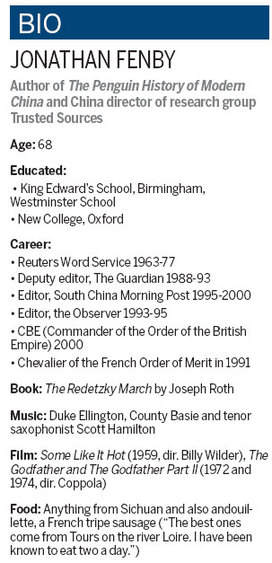 |
He was sacked from there in 1995 and was offered the chance to edit the South China Morning Post in Hong Kong, which he did for five years steering it through the handover period.
"I hadn't been to the Chinese mainland at that time. I had been to Vietnam during the Vietnam War but that was the closest I had got, apart from Hong Kong. It obviously meant a great change of life," he says.
He readily admits this change of life has made him a sort of accidental Sinologist. Since that time he has written acclaimed books about China but also about France, for which he also has a passion.
De Gaulle, the subject of his latest biography, is arguably as important figure in French history as Mao Zedong is in China's.
"I believe in the great men of history theory. People like Mao, Deng Xiaoping, de Gaulle, Churchill and Roosevelt make a huge difference. They make the weather but I think in a sense also they still have the sky around them," he says.
Fenby finds he has a contrasting approach to writing about French and Chinese history.
"When I write about France, I spend more time dealing with the contemporary period because my knowledge of French history, let's say before 1900, is more what I remember from my education. With Chinese history I have gone more back into the past," he says.
"It is perhaps easier also to write about the contemporary period in France since there are more diaries, memoirs and private papers than is the case in China."
Fenby feels modern day China has got many challenges and that the next 30 years are going to prove more difficult than that last 30 since reform and opening-up in the late 1970s.
"The argument put forward is that, oh dear, America is declining, Europe does not know what to do with itself and this great power (China) will stride out and take over everything. I am not sure this view can be sustained. China has so many issues with which it needs to get its house in order," he says.
"China's GDP will inevitably overtake that of America, some time probably around 2030, but just as you multiply everything by 1.3 billion people to get the world's largest car sales, when you divide China's economic output by that number, you begin to see the level of catching up it needs to do."
Fenby says he will go into writing his next book about China with a completely open mind.
"I know that is unfashionable. You normally know the end of the story before you start. I am not, however, much of a seer. The book may reach some kind of conclusion but I won't reach it until I have finished it," he says.
E-paper
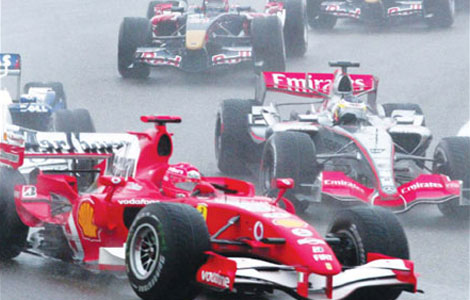
Green light
F1 sponsors expect lucrative returns from Shanghai pit stop
Preview of the coming issue
Toy for rich boys
Reaching out
Specials

Share your China stories!
Foreign readers are invited to share your China stories.

No more Mr. Bad Guy
Italian actor plans to smash ‘foreign devil’ myth and become the first white kungfu star made in China.
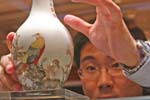
Art auctions
China accounted for 33% of global fine art sales.
